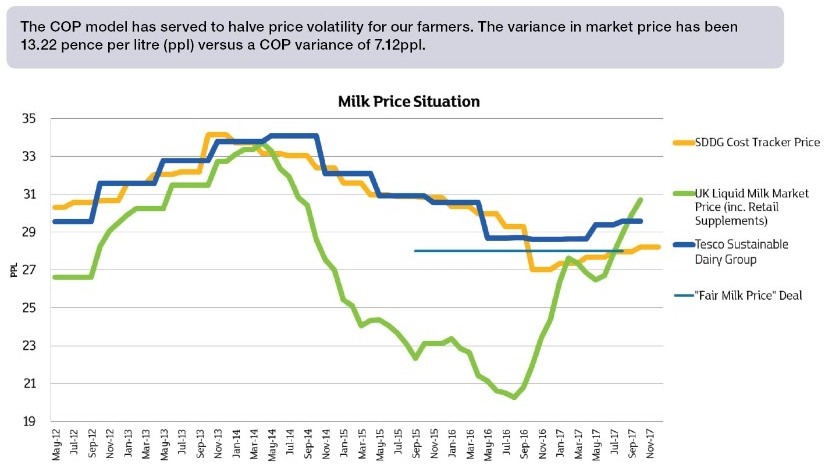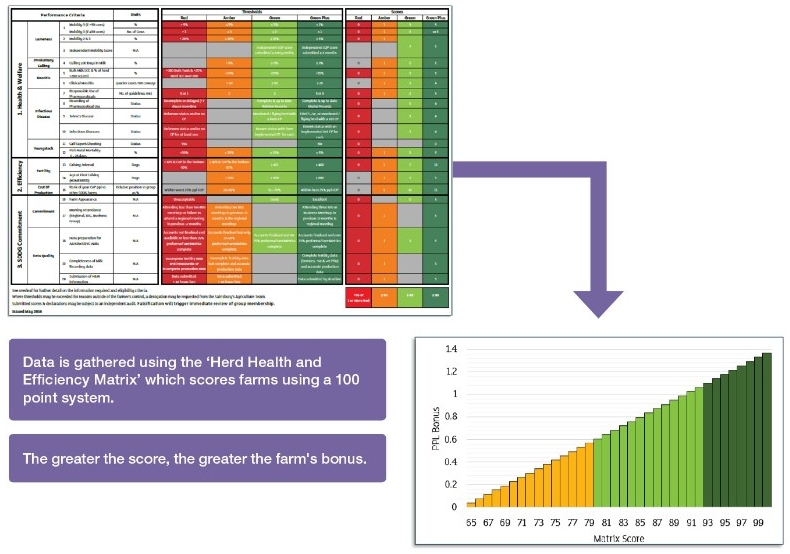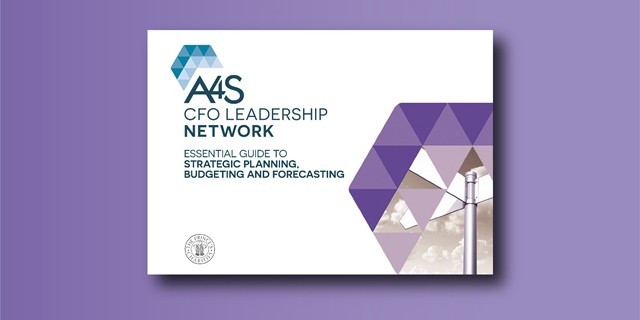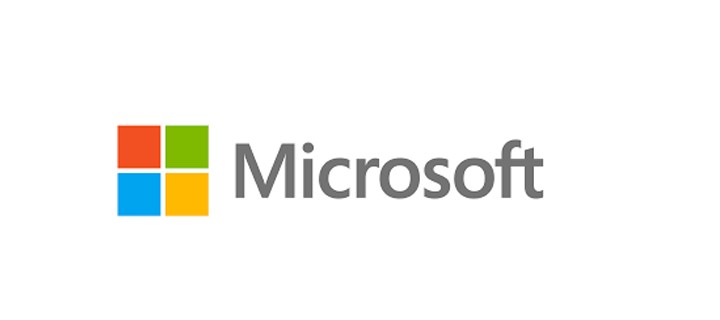Sainsbury's: Strategic Planning, Budgeting and Forecasting
Utilizing a big data approach to streamline our existing supply chain
THE MODEL
Our Cost of Production (COP) model is aimed at protecting dairy farm businesses from market volatility, both with respect to the price paid for their milk and the major input costs to the farms. The model moves dairy pricing away from standard market pricing to a financially open book cost based approach, based on data independently collected from the 320 Sainsbury’s Dairy Development Group (SDDG) farms. The COP model took 18 months’ work with the SDDG farmers and an independent dairy accounting specialist. In March 2012, 86% of the SDDG voted in favour of adopting the COP model. Every SDDG farm provides financial data which is then compiled into an average pence per litre for the group. All costs apart from the 3Fs (feed, fuel and fertilizer) are fixed for 12 months. On a quarterly basis, the 3Fs are adjusted to account for the actual market fluctuations.

The role of big data
As well as collating financial data from the 320 farms in the Group, a significant amount of data is collected on herd health and efficiency. Each of the farms is incentivized to drive continual improvement using our ‘Herd Health and Efficiency Matrix’ which scores farms using a 100 point system. Submitted scores and declarations are subject to independent audit. The matrix scores are then used to reward excellence: the greater the score, the greater the farm's bonus. Data is also collected to support our Bovine Viral Diarrhoea (BVD) Control Scheme, aimed at eradicating BVD from our herds. This covers 250 farms, 20,000 heads of cattle and the results of over 2,500 blood samples. The data collected evidences that despite our cows producing more milk, they are healthier.

Finance team involvement
The finance and commercial teams have actively led the Cost of Production initiative in conjunction with the agriculture team at Sainsbury’s, who are responsible for the day to day interaction with farmers. There has been a contraction in the British dairy industry with large numbers of farmers going out of business, and there was therefore a clear commercial imperative to safeguard the milk supplies in the UK market. The challenge and opportunity was to give our dairy farmers the stability and confidence to invest in the future of their businesses and protect them from market volatility. In doing so we have ensured consistent, resilient milk supplies whilst also ensuring a sustainable future for the SDDG farmers. The implications that implementing the COP model had for our business and the SDDG farmers was significant. We have decoupled our price negotiation from the market and linked our costs to a different set of volatile inputs beyond our control. Farmers have also decoupled their price negotiation from the market. This required strong buy in from the Operating Board at Sainsbury’s and our SDDG farmers. It was only the quality of the financial model, its data, governance and the processes that underpin it that was able to give the confidence and establish the trust within and across the businesses involved. The independence of our finance team internally and the independent nature of the dairy accounting specialist externally further supported this approach, working closely with SDDG farmers and our commercial, technical and agriculture teams throughout the process.
The benefits
The COP model serves to strengthen the long term commitment we have made to the SDDG as it guarantees them a sustained business margin which is something a market price is unable to do. The business margin element is a fundamental part of the model as it encourages investment and profitability. Our business recognizes that the most important part of sustainability is financial sustainability, which this model now secures. Financial certainty gives our farmers the confidence to invest in farm buildings, handling equipment and proactive herd health planning with their vet. These investments have already resulted in improvements to cow comfort which is contributing to us delivering our 2020 commitment to higher animal welfare standards on farm. These improvements ultimately lead to increased production efficiencies, which in the long term will bring the cost of producing a litre of milk down and reducing its environmental impact but, as the model secures a business margin, farms will remain profitable. Since January 2014 our COP price has been below the market milk price. Farmers have accepted this because it is based on data that is derived from their own businesses. The model, its data and governance gives the trust that the farms are still making a business margin. However, the market has now started to take a downward turn from which the SDDG will be protected which in turn will also protect our business from the negative PR that market volatility can generate.



